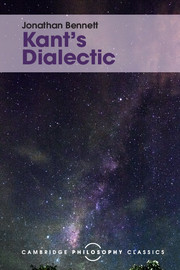Book contents
- Frontmatter
- Contents
- Preface to this edition by Karl Ameriks
- Preface
- System of references
- 1 Introduction
- 2 Concepts and intuitions
- 3 Substances and reality
- 4 The substantiality of the soul
- 5 The simplicity of the soul
- 6 The identity of the soul
- 7 Infinity
- 8 Limits
- 9 Divisibility
- 10 Freedom
- 11 God
- 12 Reason
- Index
- Frontmatter
- Contents
- Preface to this edition by Karl Ameriks
- Preface
- System of references
- 1 Introduction
- 2 Concepts and intuitions
- 3 Substances and reality
- 4 The substantiality of the soul
- 5 The simplicity of the soul
- 6 The identity of the soul
- 7 Infinity
- 8 Limits
- 9 Divisibility
- 10 Freedom
- 11 God
- 12 Reason
- Index
Summary
The Kant–Frege view
After psychology and cosmology, Kant has a final chapter on theology. This treats three traditional arguments for God's existence, starting with the so-called ontological argument, which goes somewhat as follows.
If the word ‘God’ means, in part, ‘being which is omnipotent, benevolent, omniscient…’, then anyone who says ‘God is not omnipotent’ either contradicts himself or is not using ‘God’ with its normal meaning. Now, ‘God’ means, in part, ‘being which is existent, omnipotent, benevolent…’ That implies that anyone who says ‘God is not existent’ either contradicts himself or is not using ‘God’ in its normal meaning; whence it follows that ‘God is existent’, normally understood, is guaranteed as true just by the meaning of its subject-term.
Kant rejects this argument because, he says, ‘existent’ has no right to occur in a list of terms purporting to express what an item must be like in order to qualify for a certain label. Existent things are not things of a kind; existence is not a state or quality or process; ‘existent’ is not a predicate. ‘“Exist”… is a verb, but it does not describe something that things do all the time, like breathing, only quieter – ticking over, as it were, in a metaphysical sort of way.’
Kant puts this by saying that ‘existent’ is not a ‘real predicate’ or a ‘determining predicate’. It and its cognates can behave like predicates in a sentence, he admits, as when we say ‘Unicorns don't exist’, which may seem to report something that unicorns don't do. But that only qualifies it as a grammatical or ‘logical’ predicate:
Anything… can… serve as a logical predicate; the subject can even be predicated of itself… But a determining predicate is a predicate which is added to the concept of the subject and enlarges it… ‘Being’ is obviously not a real predicate; that is, it is not a concept of something which could be added to the concept of a thing.(626)
Recall that a thing's ‘determinations’ are its properties or qualities. To ‘determine’ something is to discover or report detail about it.
- Type
- Chapter
- Information
- Kant's Dialectic , pp. 230 - 260Publisher: Cambridge University PressPrint publication year: 2016



